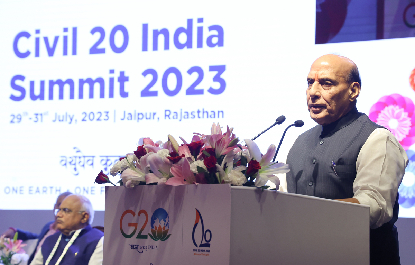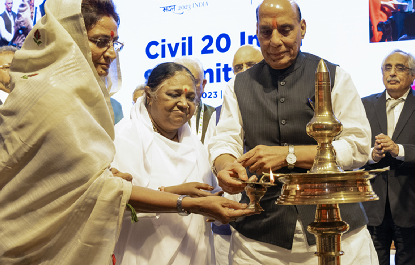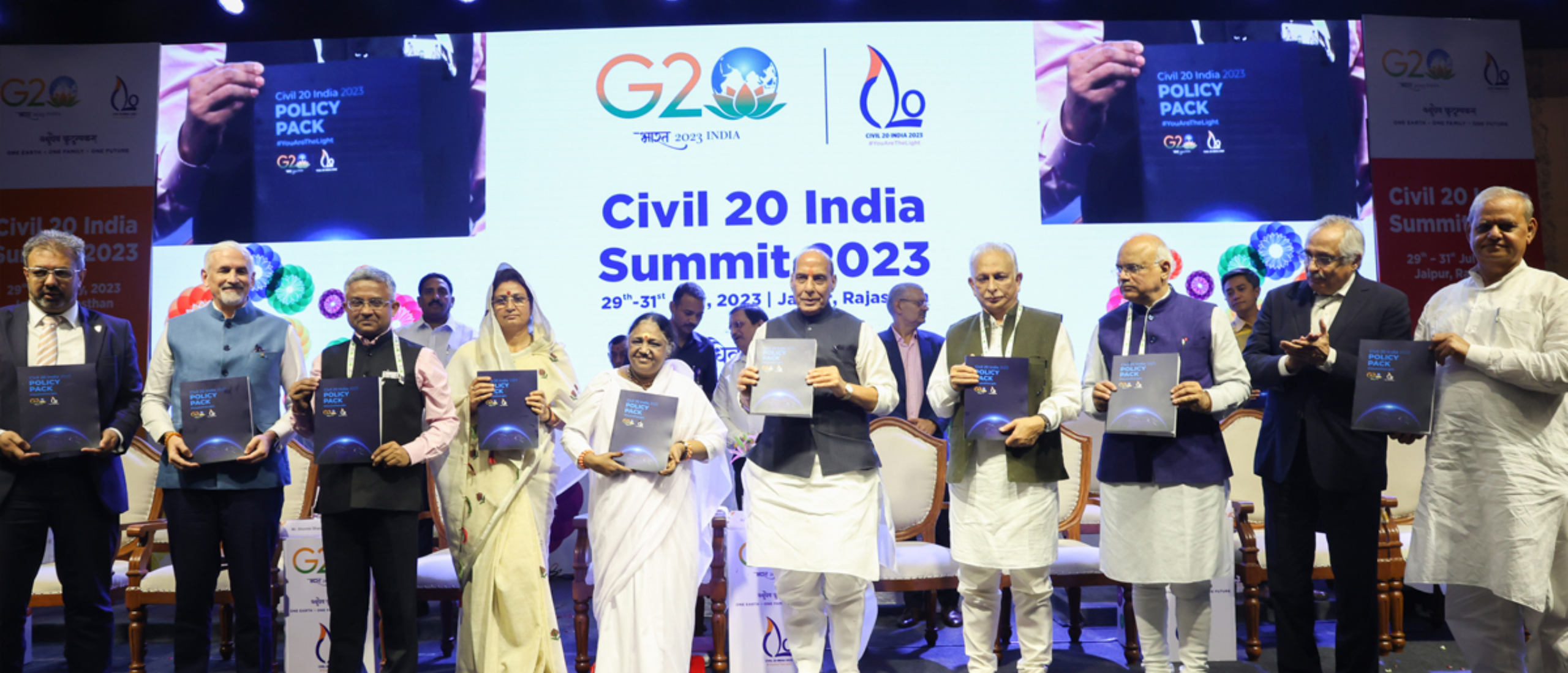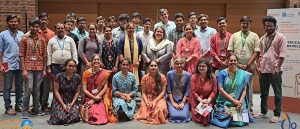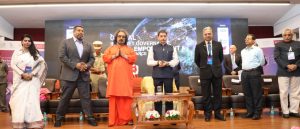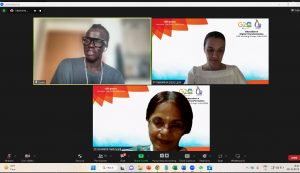As Chair of G20 India’s Civil Society Engagement Group, Amma shared that a pathway of hope for the world’s future has opened through C20’s deliberations. Humanity must work as a unified whole to ensure long-term existence and safety for the planet.
The Summit of Civil 20 (C20) is underway in Jaipur. From India and around the world, 1,090 attendees are participating in the three-day event with Amma as Chair of the official Engagement Group for India’s G20 Presidency.
The main highlights of the Jaipur C20 summit are the release of the C20 Policy Pack and the C20 Communique—C20’s policy recommendations developed by 16 Working Groups after extensive discussions with civil society organisations and policymakers worldwide. These important documents will be handed over to the G20 Secretariat.
In her address at the gathering, Amma expressed: “One of the key insights that arose from the deliberations was that in order to ensure the long-term existence and safety of humanity, it is necessary to embrace certain overarching values and principles, and work together as a unified whole. Indeed, the emergence of such a sentiment can be seen as a positive sign, opening the path for hope.
“There will always be some people who will discourage us and obstruct our progress. We should never allow them to shake our confidence and conviction in fulfilling our svadharma [personal duty]. Only if we have self-confidence can we benefit society through our efforts. Self-confidence is helpful for making forward progress. We convene meetings now, but we should make it possible for our hearts also to meet.
She also said: “The ethos of vasudhaiva kuṭuṁbakam—“The world is one big family”—should be incorporated into the school curriculum. Humanity’s future path, contemplation and actions must reflect a degree of this shared sense of unity. If not, our greed will reach such a pinnacle that it will threaten our very existence. Nature has been giving us strong indications over the past several years that this is the direction in which we are headed. If we do not heed these warnings from nature and God, human beings will very soon be added to this planet’s list of extinct creatures.
Amma concluded: “May we be able to see the world as a beautiful flower, with each nation one of its petals. This beautiful and priceless Earth is a rare blessing that God has bestowed to humans and our fellow creatures. May her beauty and joy never wane, and may she live forever, spreading happiness and fragrance to everyone, always. May divine grace bless everyone to realise the dream of vasudhaiva kuṭuṁbakam—The world is one big family.”
On such a momentous occasion, it was clear that the C20 team with all its 16 Working Groups had undertaken their work with utmost sincerity, love, and dedication. Each and every one worked day-in and day-out to explore, gather the necessary information, research, polish, and fine tune the grassroots-level problems of people.
Addressing the delegates at the inaugural program, Shri Rajnath Singh, Hon’ble Minister of Defence, Govt. of India, said: “India assuming the presidency of G20 has presented us a historic opportunity to address global challenges through discussion and dialogue. Hopefully, we can also come up with a response to them. Based on the philosophy of vasudhaiva kuṭuṁbakam and worshipping various manifestations of nature, the Indian civilisation doesn’t believe in ‘othering’ anyone based on parameters like race or religion.
“We have never seen others as different from ourselves. The ancient Indian concept of ‘as is the microcosm, so is the macrocosm’ has great significance in a world facing drastic climate change and environmental degradation due to mankind’s insatiable greed. The approach of ‘one world, one family’ provides a much better way to live our lives and design our socio-economic structures.”
Shri Rajnath Singh said civil society organisations have been an intrinsic part of Indian history for thousands of years. They played a significant role in shaping the socio-cultural and political fabric of the society. While kings upheld the rule of law, civil society groups were instrumental in operationalising its ideals in the society. Structures like Buddhist Sanghas, merchant guilds, temples and ashrams fostered a sense of unity and harmony among people.
He added that there is a healthy growth of civil society organisations across the globe, and they are positively impacting policy making in various areas. Even though they complement the government, the functioning of the two is vastly different. The Government apparatus is more rigidly organised and institutionalised. Meanwhile, civil society groups are fluid, informal and nimble-footed structures which provide a huge scope for new ideas and processes to play out at the grassroots level. Their successful endeavours can be adopted by Governments at the macro level.
“Comparative advantages of civil society groups and traditional government structures can be harnessed for the overall progress of the society. The former can act as force multipliers for the government. Their efforts for the betterment of the vulnerable groups have significantly altered the social and economic landscape of India in a very positive measure. There is no better example of this than Amma, Sri Mata Amritanandamayi Devi, herself,” said the Minister.
Shri Vijay Nambiar is a retired Ambassador of India and is also a former Under-Secretary General of the United Nations. He served as Principal Coordinator for C20 India. Addressing the Summit he said: “India has been highlighting the major issues facing the global community in the present fragile global environment. The C20 has also been playing a big role in this direction. The civil society calls on the UN and the G20 to take bold action, including through substantial financial commitments, to help achieve the critical Sustainable Development Goals. Civil society around the world should have sufficient space to play a fitting role in the implementation of this agenda.”
He added: “Civil society organisations are both the bridge and the moral compass that transcend the state and prevent it from atomising society. They enhance public accountability by making the state more responsive with more inclusive development policies through building a larger consensus on social goals.The 16 Working Groups of C20 have proposed a wide array of policy recommendations on each of their thematic areas. They have also come up with specific examples of successful work that has already been done by civil society organisations in each area of focus which could be replicated elsewhere in the world.”
Other dignitaries present during the inaugural ceremony included Smt. Shakuntala Rawat, Hon’ble Minister of Industry, State Enterprises & Devasthan, Govt. of Rajasthan; Swami Amritaswarupananda Puri, Troika, C20 & Vice Chairman Mata Amritanandamayi Math; Sri M, Core Committee Member, C20; H.E. Mr. Federico Salas Lotfe, Ambassador, Embassy of Mexico; Ms. Nivedita Bhide, C20 Core Committee; Shri Chandra Prakash Joshi, MP, Rajasthan; Sri Joginder Singh Awana, MLA, Rajasthan; Shri Shombi Sharp, UN Resident Coordinator; Dr. Vinay Sahasrabuddhe, Sous-sherpa C20 India; Shri Ah Maftuchan, Sherpa C20, Indonesia; Shri Niklaus Gugher, Member of the National Council (Switzerland); and Shri Abhay Thakur, G20 Sous Sherpa.
The G20 (Group of 20) is a forum comprising 19 countries and the European Union. It works to address major issues related to the global economy. C20 provides a platform for Civil Society Organisations (CSOs) around the world to voice people’s aspirations to the world leaders in G20.
